Have you ever wondered how baby wipes became the most commonly used wipes? While store-bought wipes are convenient, many people prefer homemade wipes for their baby’s skin. Homemade baby wipes are more economical and of better quality. They also have several uses that you might not have thought of.
There’s no shortage of baby wipes for sale in the market today. With the advancement of technology, many homemade wipes are also available. This blog is for you if you want to save money and get a soothing skin-care experience from homemade wipes. Read to learn about how to make homemade baby wipes.
We’ll discuss ingredients and tips for making homemade baby wipes. We’ll discuss the ingredients needed to make homemade baby wipes and how to make them. Also, we’ll tell you the various uses of baby wipes and tips to follow while making them. Lastly, we’ll tell you the pros and cons of homemade baby wipes and whether you should use them.
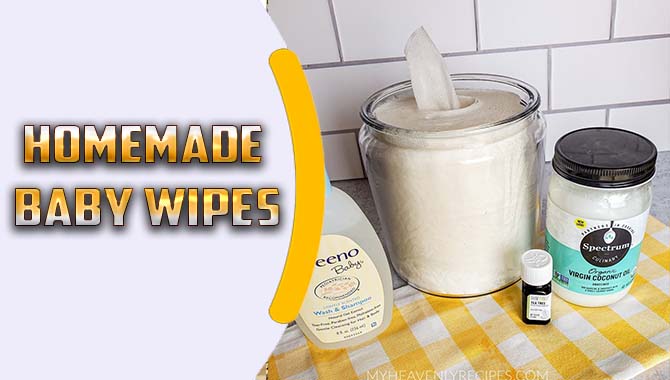
What Are Baby Wipes?
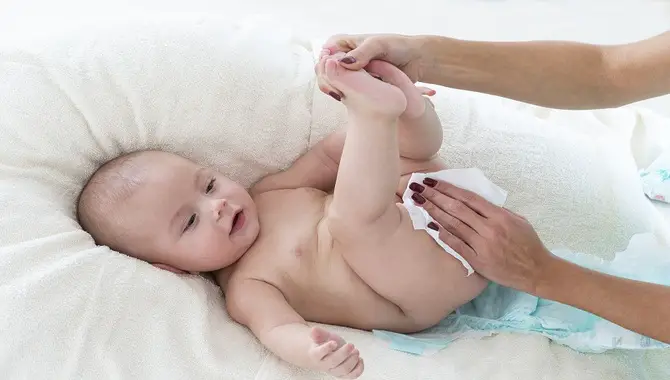
Baby wipes are a type of cloth diaper-cleaning solution. Baby wipes are made from natural materials like water and oil. They’re designed to clean a baby’s skin, face, and hands. You can customize many babies wipe recipes to meet your family’s needs or baby-specific needs.
You can make baby wipes using simple ingredients like water and oil. Or you can get creative by adding essential oils and other additives. The ease of making homemade baby wipes makes them a cost-effective option for families. They’re easy to store and carry around, making them the perfect solution for on-the-go baby care.
Ingredients For DIY Baby Wipes
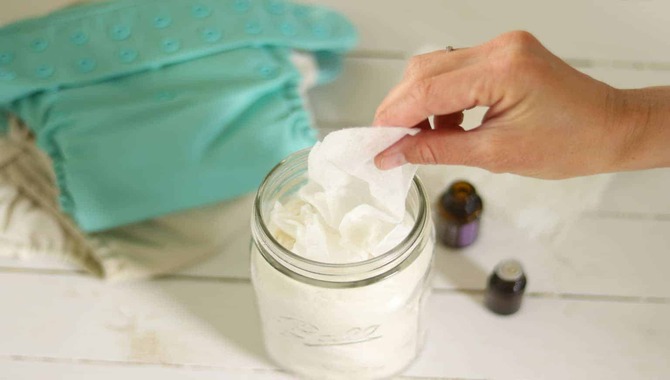
The basic ingredients for homemade baby wipes are water and oil. You’ll also need baby wipes-specific ingredients like baby wash, essential oil, or fragrance. Here’s a list of the essential ingredients you’ll need to make homemade baby wipes:
- Water: Baby wipes require water to function properly. Use purified water if possible. Tap water can work fine, but be aware that it contains chlorine which can irritate the skin.
- Oil: Baby wipes work better with liquid oil than solid oil because the liquid wraps around the skin more easily and leaves no residue on surfaces like parcel ain. Because baby wipes are designed to touch delicate skin, choose a natural oil like olive oil, coconut oil, or castor oil. Avoid oils with vitamin A (like canola and corn) because they may irritate.
- Baby Wash: Baby wash is essential for removing dirt and residues from a baby’s skin. Look for water-free baby wash products that are fragrance-free and gentle on the skin.
- Essential Oils: Many families add essential oils to homemade baby wipes for scent or other health benefits. You can use any type of essential oil– lavender, peppermint, tea tree oil, etc. Just be sure to dilute the oil before adding it to the wipes solution.
- Fragrance: Many families add fragrance to homemade baby wipes for a more baby-friendly scent. Look for unscented baby wash products or add a few drops of your favorite essential oil before making the wipes solution.
How To Make Homemade Baby Wipes
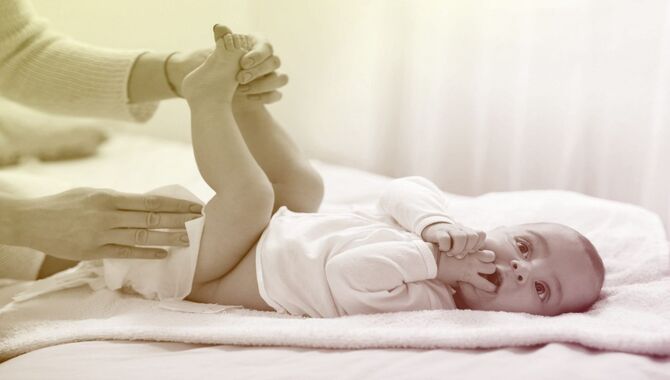
Baby wipes are a safe alternative to disposable wipes, which can harm the environment. Plus, homemade baby wipes are easy to make and customize, so you can create wipes that perfectly match your baby’s delicate skin. As with any cloth diaper cleaning solution, it’s important to wash cloth diaper inserts thoroughly with water before using them with a wipe solution to avoid irritation of sensitive skin.
Overall, homemade baby wipes are an economical and environmentally-friendly option that can help provide your baby with gentle care and protection. Making baby wipes is a great way to save money and avoid harmful chemicals. Homemade baby wipes are easy to make and are much more effective than store-bought versions.
To make homemade baby wipes, you’ll need basic supplies: a pot, a few pieces of cloth, water, soap, and a cloth sack. First, mix the soap with enough water to create a thick paste. Then, add the cloth sacks to the pot and fill them with a soapy mixture. Hang the pots over a clean fire or place them in a warm oven until the cloth sacks are fully saturated (around 20 minutes). Once saturated, remove them from the heat and let them cool down before using.
Uses Of Baby Wipes
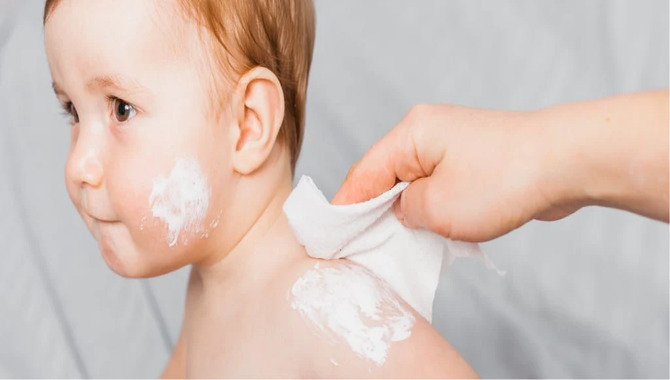
Baby wipes are an essential part of any parent’s cleaning arsenal. You can use them to clean off a baby’s face, hands, and feet after meals or during playtime. You can also use them to remove dirt from surfaces around the house. If you prefer making baby wipes, homemade options are a quick and easy way to save money and make cleaning supplies.
Instead of buying disposable wipes, make your own from cloth or disposable wipes cloth diapers. You can also use baby wipes spray bottles to make your homemade wipes. By using reusable storage containers, you can keep your wipes organized and easily accessible in the bathroom of your child’s room.
How To Store Homemade Baby Wipes
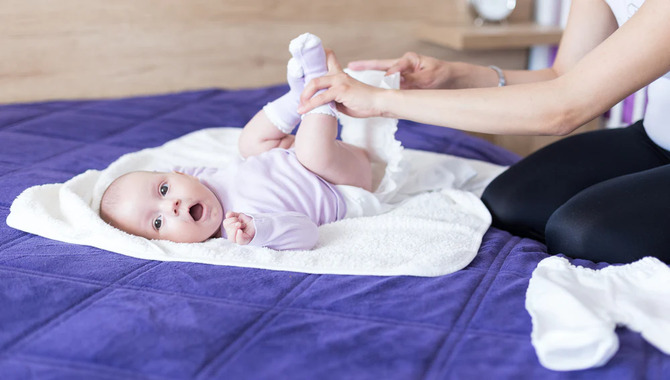
Homemade baby wipes are easily homemade, but it’s important to store them so they won’t become moldy or dry out. As baby wipes are sensitive to water and sunlight, they should be stored in an airtight container away from these sources. You can use a sterilized wipes case or snap closure baby wipes container, but ensure the snaps are secure to prevent wipes from becoming damp and moldy.
You can also label the wipes with the date of purchase and contents. This will help you track how many wipes you have used and avoid wastage. You must store homemade baby wipes in a dark, dry place and remove used wipes immediately after using them. This will help keep the wipes hygienic and prevent them from becoming delicate.
Safety Tips While Making And Using Baby Wipes
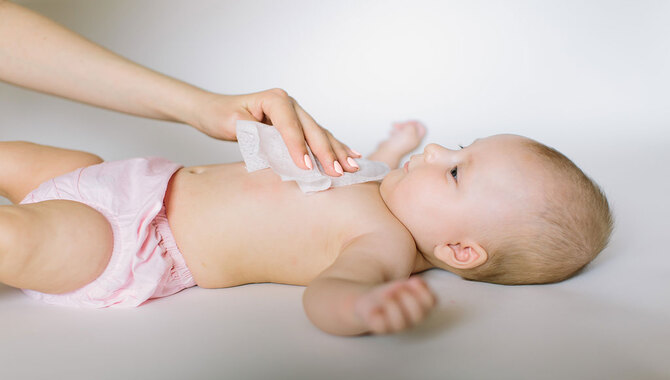
Baby wipes are a great alternative to disposable wipes for baby care. However, proper handling of baby wipes is essential to ensure that the wipes are safe and effective. Here are some safety tips to follow while making and using baby wipes
- Always use new, uncontaminated wipes for each baby – this ensures the highest level of hygiene.
- Make sure the wipes are cool to the touch before using them – this will help prevent the baby from becoming uncomfortable or uncomfortable due to a cold wipe.
- Store wipes in an airtight container out of reach of children – this will help prevent accidental exposure to bacteria.
- Always remove any stickers or labels from the wipes before using them – this will help prevent confusion and misidentification of wipes.
- Do not reuse or wash towels used to make wipes – they may contain harmful bacteria that could cause infant illness.
Things To Keep In Mind While Making Baby Wipes

Making baby wipes is a very easy task. You can use any cloth and baby wipes of your choice. However, it is important to choose a safe and effective disinfectant to avoid causing harm to the baby’s skin. Any water-based disinfectant, such as soap or washing-up liquid, would work fine, but follow the manufacturer’s instructions.
The wipes should also be soft enough to avoid irritation of the baby’s skin. To test the wipes, gently rub them between your fingers and check if they are soft enough. Another essential factor to consider while making baby wipes is water temperature.
Ensure the water is warm but not too hot, as this would cause burns on the baby’s sensitive skin. It would be wise to adjust the water temperature based on the baby’s age and physical condition. Lastly, make enough wipes for each diaper change, so there is no chance of them being wasted. Also, store the wipes in a cool, dry place to remain hygienic and fresh for longer.
Conclusion
If you’ve decided to use homemade baby wipes, keeping a few things in mind is important. First, homemade baby wipes are a great substitute for store-bought wipes. They’re made from natural ingredients and can be easily made at home. However, they do have their limitations too.
Before using homemade wipes, you need to make sure that the wipes are baby-friendly and water-based (water-soluble) wipes are of the best quality. And if you’re not comfortable making baby wipes, you can opt for commercial baby wipes instead.
It’s time to ditch the store-bought wipes and give these homemade baby wipes a try. You’ll be amazed at their effectiveness and efficiency, we promise. With the above knowledge, you’re well on your way to making homemade baby wipes.
Frequently Asked Questions
How Do You Make Homemade Baby Wipes?
To make homemade baby wipes, you will need the following items:
A bottle of water
Baby wipes
A plastic bag
To make the wipes, fill the bottle halfway with water and place the baby wipes inside the bottle. Close the bottle of water and shake it vigorously to mix the baby wipes and water. Place the plastic bag over the mouth of the bottle and twist the top of the bag tightly to seal it. Store the wipes in a dry place.
Are Homemade Baby Wipes Safe?
Homemade baby wipes are safe to use if you follow the instructions provided. Make sure to select a water-based disinfectant that is safe for the baby’s skin.
What Can I Put In Homemade Baby Wipes?
Homemade baby wipes are just water, soap, and oil. However, you can add essential oils or fragrances to your wipes. You can add ingredients like oatmeal, clay, chia seeds, etc., to make your wipes more absorbent.
How Do You Make Natural Wet Wipes?
To make the wipes, Fill a small pot halfway with water and place baby wipes inside the pot so that they are submerged in water but not dripping. Wet two cups of cloth or paper towel, if using. Place sunscreen and essential oil of choice on top of the soaked tissue. If desired, Remove the diaper from the baby and set the baby on a towel, blotting the diaper dry.
What Ingredients Should I Use To Make My Baby Wipes?
o make homemade baby wipes, you can use water, baby wipes, oil, and soap. However, you may want to add essential oils or fragrances if you want them to smell nice. You can also add ingredients like oatmeal, clay, chia seeds, etc., to make the wipes more absorbent.

